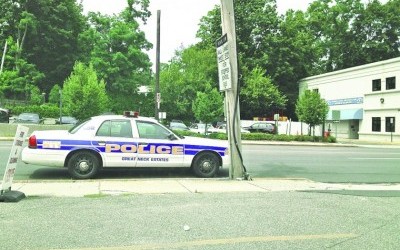A spat between the villages of Great Neck Estates and Great Neck Plaza boiled over at Wednesday’s village officials association meeting over the practice of Village of Great Neck Estates police issuing tickets within the Village of Great Neck Plaza and hearing the cases in the Great Neck Estates court.
Great Neck Plaza Trustee Pam Marksheid attacked the practice at the meeting, accusing Great Neck Estates’ police of “sitting and waiting” within the Plaza’s borders.
“People are being ticketed in Great Neck Plaza and tickets are being taken to Great Neck Estates courts,” Marksheid said.
Marksheid and Village of Great Neck Plaza Mayor Jean Celender had planned to introduce a resolution calling for all tickets to be adjudicated in the court of the village where the violation took place, but decided against it following a back-and-forth between Marhsheid and Great Neck Estates Mayor David Fox.
Marksheid and Fox each accused the other in interviews with the Great Neck News of prioritizing ticket revenue over protecting drivers and pedestrians.
“This is about money,” Fox said. “They’re complaining that they’re not getting summonses issued. For us, this is about public safety.”
““To me, it seems like this is just a revenue issue, and not really one of them wanting to keep the streets safe,” said Marksheid. “If it wasn’t that, they would allow it to come to our court.”
While Great Neck Plaza relies on the Nassau County Police Department to enforce its traffic laws, Great Neck Estates has its own police department.
Fox said Great Neck Estate’s enforcement of traffic laws near its borders is legal, citing article 140 of New York Criminal Procedure Law, which says that police may arrest suspects for petty offenses within 100 yards of their area of employment.
Traffic violations are treated as petty offenses under New York state law.
When asked whether Great Neck Estates police were deliberately targeting offenses made within Great Neck Plaza, Fox said he did not see a distinction so long as officers were acting in their legal jurisdiction.
“If it’s in their jurisdiction it’s in their jurisdiction,” he said.
Ticketed driver Barbara Wallock saw it differently.
Wallock, a Utah resident who owns an apartment on Ipswich Avenue and was visiting her mother who lives in Great Neck, said she was ticketed for an illegal turn while exiting the Atria retirement home parking lot on Cuttermil Road in Great Neck Plaza.
She was quickly pulled over by a Great Neck Estates police officer, she said.
“I was just quiet at that point, because I knew that he was going to give me a ticket,” said Wallock. “I was really annoyed. The guy just wouldn’t listen to me.”
Wallock discussed the incident with her cousin, Great Neck Plaza trustee Gerald Schneiderman, who she said advised her to contest the ticket in court.
Marksheid said Great Neck Plaza recognized the legal right of Great Neck Estates police to ticket within 100 yards of its borders but that villages have a legitimate interest in judging violations that occur within its borders in the village’s own courts.
“We’re just saying this is our village. We have something called home rule. If something is done in our village, we should have the right to decide if this alleged violation occurred or not,” she said.
Marksheid also cast doubt on whether Great Neck Estates police consistently followed the jurisdiction rule, saying that while Great Neck Plaza does not have the resources to fully investigate the question she had observed police “sitting and waiting” on Great Neck Plaza streets.
Fox dismissed the criticism, saying that anecdotal complaints were unhelpful and that police could park within Great Neck Plaza so long as the offense they observed took place within 100 yards of the border.
He said much of the debate was due to a lack of understanding of the law, and that other villages such as Kensington also enforce traffic on roads immediately outside their borders.
“It’s a conceptual problem that’s not understood,” Fox said. “It’s not that the police don’t understand it. It’s that the public doesn’t understand it.”
Acknowledging that Great Neck Plaza’s legal options are limited, Marksheid said she hoped public pressure, including from Great Neck Estates residents displeased with what Marksheid described as a misuse of taxpayer money, could induce Fox to change his village’s enforcement policies.
”I would hope that if there’s a public outcry, from even his own village… that eventually Mayor Fox would say to his police commissioner, all right, lets give tickets where we should be,” she said.



